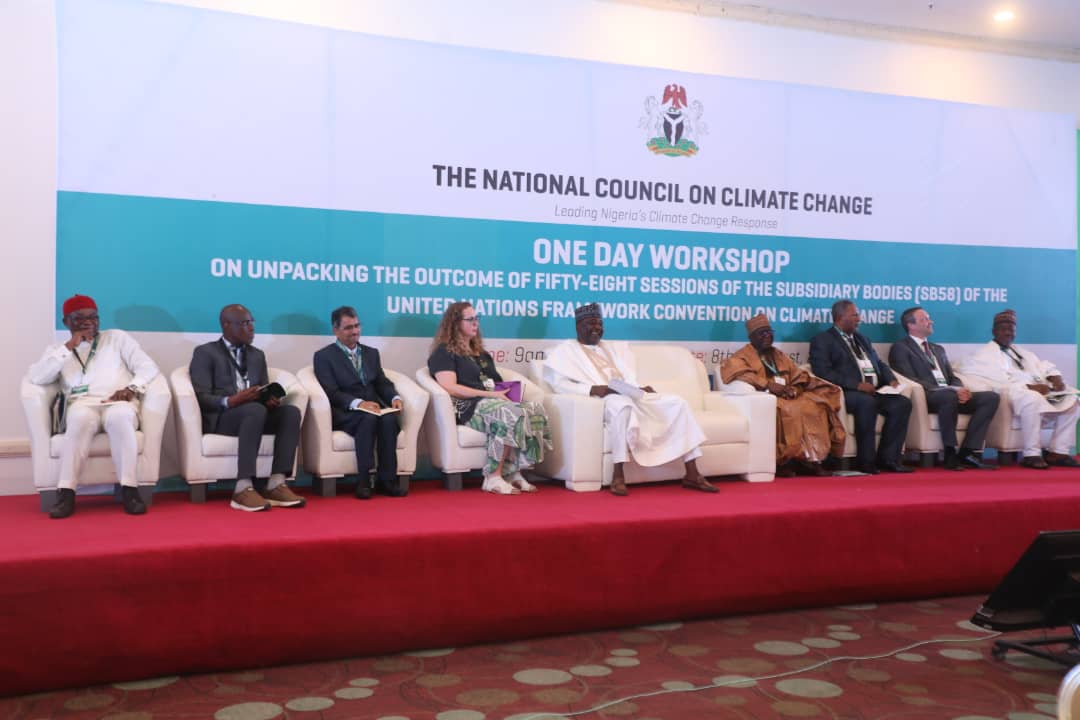
By Miriam Humbe
In order to avert future occurrences of such severe floods, the National Council on Climate Change is hereby directed to develop a Comprehensive Climate Change Adaptation Project for Flood Management in Nigeria.
The Project is to include resuscitation of the Lake Chad Basin.
Nigeria’s Vice President, Senator Kashim Shettima said this when he performed the opening ceremony for the Workshop on Unpacking the Outcomes of the Fifty-Eighth Sessions of the Subsidiary Bodies of the United Nations Framework Convention on Climate Change (UNFCCC) on Tuesday in Abuja.
Humsimedia gathered that it was the Vice President’s first engagement with key players in Nigeria’s climate change space, comprising government institutions, private sector, civil society organizations, diplomatic community and development partners.
The Vice President said that Nigeria had shown great leadership in Africa and played a critical role in the UNFCCC climate policy negotiation process, consistently advocating for a just and fair process in addressing Climate Change since becoming a Party to the UNFCCC in 1994.
Shettima said in 2015, Nigeria joined the global community in adopting the Paris Agreement, the first binding mechanism for all countries towards addressing the challenges of climate change in keeping faith with the target of limiting the increase in global temperature within 1.5oC.
Here’s what the Vice President said:
Climate change is perhaps the biggest challenge facing humanity today.
Even as a developing nation in the global south, Nigeria is gravely impacted by the negative effects of climate change.
For instance, Nigeria is ranked as one of the ten most vulnerable countries to the impacts of climate change in the world.
This is despite our negligible contribution to overall global carbon emissions responsible for climate change.
In fact, Africa as a whole, accounts for less than 4% of total global Carbon emissions.
For me and a lot of the people that come from the North Eastern part of Nigeria, we bear the scars of climate change effects and have had to live with its impacts, such as drought and desertification, disruption of rainfall patterns, leading to sandstorms, severe floods, destruction of farmlands, infrastructure and human settlements.
These and many more occur in other parts of the country too.
We are all living witnesses to ravaging floods of last year (2022) which held the country to a standstill for days.
The World Bank’s Global Rapid post-disaster Damage Estimation (GRADE) assessment put the total direct economic damage to infrastructure to be about US$7 billion.
This is equivalent to 1.6% of Nigeria’s estimated 2021 (GDP), not including loss of over 600 lives. For Nigeria, that was climate change at its worst.
Nationally Determined Contributions (NDCs) are at the heart of the Paris Agreement and the achievement of its long-term goals.
In its first NDC, Nigeria, in 2015, pledged an unconditional 20% reduction on Business-As-Usual (BAU) emissions, and a 45% conditional commitment by 2030.
In 2021, Nigeria updated its NDC, maintaining the commitment to an unconditional 20% reduction below Business-As-Usual emissions, while increasing the target for its conditional commitment from 45% to 47% below BAU emissions by 2030.
In addition, Nigeria committed to achieving Net Zero Carbon emissions by 2060.
In our determined efforts to address the adverse impacts of climate change and foster effective implementation climate change activities under our NDC, a novel Climate Change Act (2021) was signed, essentially focusing on whole of government approach, jointly with the private sector, to mainstream climate change actions in Nigeria’s economic development and ensure sustainable inclusive green growth.
The Act also provides an all-inclusive regulatory and legal framework for achieving Nigeria’s long term climate goals, that include net zero carbon emissions by 2060, adequate climate financing, as well as ensuring environmental and economic sustainability.
The Act further establishes the National Council on Climate Change, chaired by His Excellency, the President, while His Excellency, the Vice President is its Vice Chairman.
The Council includes Ministerial membership across priority sectors of the economy and is administered by a Secretariat.
At this juncture, I would like to highlight some of the giant strides that Nigeria has taken in its journey towards meeting our NDC commitments.
We have been pioneering efforts to reduce short-lived climate pollutants (SLCPs), including methane in Africa with the ongoing Nigeria Gas Commercialization Programme along with a commitment to the global Net Zero Government Initiative.
The plan for decarbonizing our energy systems highlights the key role that natural gas will play in transitioning our economy across sectors.
The data and evidence show that Nigeria can continue to use gas until 2040 without detracting from the goals of the Paris agreement.
Nevertheless, we are rapidly advancing the development and deployment of renewables through various programs such as the $550million Nigeria Electrification Project (NEP) supported by the World Bank which is promoting the use of solar mini-grid and solar home systems across Nigeria.
There is also the Nigeria Sovereign Investment Authority(NSIA) managed project jointly financed by Kano State and the Federal Government, which completed a 10MW solar plant, the largest in the country.
Another intervention is the Energizing Education Programme, implemented by the Rural Electrification Agency which is delivering clean energy to Federal Universities and Teaching Hospitals across the country.
Furthermore, government is also subsidizing clean energy for rural women through the Rural Women Energy Security(RUWES) project and Rural Energy Access Project (REAP).
Other schemes include the Clean Energy Transportation Scheme (CETS) and National Clean Cooking Scheme (NCCS) which promote the deployment of CNG powered buses in major Nigerian cities and clean cooking in communities and boarding schools respectively.
At the onset of this administration, H. E. President Bola Ahmed Tinubu, GCFR, took the bold step of bring to an end petrol subsidy.
Preliminary analysis conducted by the National Council on Climate Change on the co-benefits of fuel subsidy removal indicate that there has been about 30% reduction in daily fuel consumption, amounting to about 20 million liters, equivalent to an estimated daily saving of 42,800 tons of carbon dioxide (CO2e) emissions.
When projected over a period of one year, it amounts to over 15 million tons of CO2e saved, representing about 40% GHG reduction from the baseline projection of 45 million metric tons of total GHG CO2eq by 2030.
This places Nigeria on course to achieving our NDC targets ahead of time.
The Fifty-Eight Sessions of the Subsidiary Body of the United Nations Framework Convention on Climate Change (UNFCCC SB58) which was held in Bonn last June, I am told, is a very important and pivotal event in the UNFCCC Climate Change calendar and Nigeria was well represented at this event.
It served as technical sessions to guide and support Parties towards achieving robust outcomes at the twenty-eighth session of the Conference of the Parties (COP 28) holding in the United Arab Emirates later this year.
Our vision and expectations for COP 28 will include increased climate action on many fronts, particularly increased and available climate finance.
We note with concern, the lack of progress on the mobilization of the $100 billion meant for adaptation financing by 2020 pledged by western countries since 2009 at COP15.
The Loss and Damage agreement which provided hope for many low-income countries bearing the brunt of climate change, must be finalized in Dubai; Just Energy Transition where we expect discussions to focus incentivizing and enabling emerging economies to transit sustainably in accordance to their national priorities, capacities, and based on greater financial support must also be finalized, taking cognizance of the need to include more favorable terms for developing countries, along with technology transfer.
Our intention is to lead the ECOWAS sub region by example, leveraging on our accomplishments in championing the cause for regional climate actions at every international forum held over the years.
The 2023 Africa Climate Week and Africa Climate Summit, both holding next month in Nairobi, Kenya, will provide platforms to reiterate the call for continued partnership, unity, cooperation and genuine collective efforts towards tackling the challenges of climate change.
Our shared destiny as a global community is ultimately dependent on the successes we are able to achieve together.
As Nigeria prepares for the Twenty-Eighth UN Climate Change Conference of Parties (COP 28), we will continue to build on the success of COP 27, where the Article 6 conundrum was finally resolved, ushering in the possibility of operationalizing the African Carbon Markets.
The country’s vision and expectation of the COP 28 will be hinged on the operationalisation of the Loss and Damage funding as we continue to intensify efforts to mobilize additional Climate Finance.
The provision of finance from developed to developing countries reflects the historical causes and current drivers of climate change, and the inequitable distribution of climate change impacts and vulnerabilities.
I therefore once again urge the global community to honour their various commitments.
Currently the National Council on Climate Change is in discussions with the Green Climate Fund, the Nigeria Sovereign Investment Authority (NSIA), the Infrastructure Corporation of Nigeria Ltd (INFRACORP), Ministry of Finance Incorporated (MOFI), KfW Development Bank, and other relevant partners, to accelerate the mobilization of additional financing and support for Nigeria’s Climate actions.
They will be given all necessary support needed to enable it succeed.
Permit me at this juncture to close by thanking you all for your kind attention and also to congratulate the NCCC for its efforts in putting this event together.
Climate change is now inter-disciplinary, multi-layered and inter-connected system.
It therefore requires good governance and high-level coordination.
The road to an inclusive engagement in global climate discourse starts with national discussions such as this.
So, by all means, do ensure that our national priorities are escalated and showcased here and in the negotiations at Dubai later in the year.
The Vice President began his address by acknowledging the immense support and assistance given to the Government of Nigeria by our dependable friends such as United Nations Development Programme (UNDP), the European Union, United Kingdom High Commission, United States Embassy, The German Mission in Nigeria, Embassy of France, The World Bank, The Islamic Development Bank, United Nations Industrial Development Organization (UNIDO), United Nations Environmental Programme (UNEP), Africa Development Bank, Nationally Determined Contributions (NDC) Partnership and several others.


